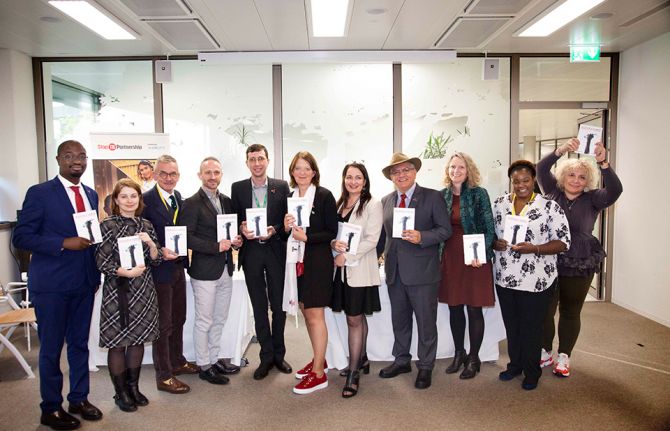

Feature Story
Declaration of the Rights of People Affected by Tuberculosis launched
16 May 2019
16 May 2019 16 May 2019Tuberculosis (TB) is the world’s number one cause of death from an infectious disease and remains the leading cause of death among people living with HIV, despite being preventable and curable. Reacting to the unacceptable burden of disease and death caused by TB, a new network of TB survivors and affected communities, called TB People, compiled the Declaration of the Rights of People Affected by Tuberculosis, with the support of leading human rights lawyers and the Stop TB Partnership.
The declaration, launched on 14 May at the Global Health Campus in Geneva, Switzerland, will guide countries to implement the commitments made at the 2018 United Nations High-Level Meeting on Tuberculosis and will inform the last board meeting of the Global Fund to Fight AIDS, Tuberculosis and Malaria (Global Fund) before its replenishment meeting in Lyon, France, in October.
“Too many people have been buried whose lives could have been saved if their rights had been protected,” said Maurine Murenga, communities representative on the board of the Global Fund. “Too many children have survived and been cured of tuberculosis only to be forced to sit isolated on one side of their classroom with their classmates on the other side,” she added.
The lack of human rights protections makes people more vulnerable to developing TB disease, negatively affects their ability to access effective treatment and exposes them to stigma and discrimination by the very fact of having TB. TB-related human rights violations include failures to diagnose or treat people properly, restricted access to health information by people living with TB and shackling prisoners accessing TB treatment in hospital.
For the first time, the rights of people affected by TB that are enshrined in existing global and regional human rights laws are listed in one declaration alongside an explanation of their relevance for people affected by TB. This innovative declaration aims to inform and empower people and communities affected by TB to be able to claim and protect their right to a life free from TB and when necessary to ensure equitable access to quality TB prevention, diagnosis and treatment, free from stigma and discrimination.
“Communities must be put at the centre of the response to tuberculosis ”, said Shannon Hader, UNAIDS Deputy Executive Director, Programme, adding that, “People have the right to science and to be empowered to demand access to the most effective tuberculosis medicines, diagnostics and vaccines—those available now and those we’re striving to create for the future.”
The declaration also seeks to ensure that governments and other service providers are aware of their commitments and obligations to protect and promote the rights of people affected by TB.
During the launch of the declaration, many TB survivors, activists and partners shared stories about how TB and the denial of their rights had directly affected them or their families, including Tedros Adhanom Ghebreyesus, the Director-General of the World Health Organization, whose brother almost died from TB for fear of the stigma that surrounds the disease.
Rhea Lobo from TB People described her harrowing experience of having bone TB. The report on her initial bone samples was lost for several months. She was denied a copy of the results so that she could not seek a second opinion and had to resort to smuggling the results out to photocopy and return them. A new doctor discovered that she had been given the wrong treatment dose for six months, putting her at risk of developing drug-resistant TB.
The declaration was dedicated to the memory of Dean Lewis, a tireless activist for the rights of people living with TB and people who use drugs, who had suffered several episodes of TB. Dean was among the core group who conceived and compiled the declaration but died before its completion, owing to the lack of the health services he needed.



